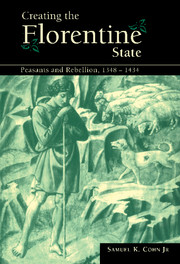Book contents
- Frontmatter
- Contents
- List of illustrations
- List of tables
- Acknowledgements
- Note on citations, dates, and measures
- Introduction
- PART I CULTURE, DEMOGRAPHY, AND FISCALITY
- PART II PEASANT PROTEST IN THE MOUNTAINS: THREE VIEWS
- PART III GOVERNMENTAL CLEMENCY AND THE HINTERLAND
- 7 Florentine peasant petitions: an institutional perspective
- 8 The reasons for assistance
- 9 What the peasants won
- Conclusion
- Appendix 1 Regression models: wealth, migration, and taxes
- Appendix 2 Tax coefficients, 1354–1423
- Bibliography
- Index
9 - What the peasants won
Published online by Cambridge University Press: 07 August 2009
- Frontmatter
- Contents
- List of illustrations
- List of tables
- Acknowledgements
- Note on citations, dates, and measures
- Introduction
- PART I CULTURE, DEMOGRAPHY, AND FISCALITY
- PART II PEASANT PROTEST IN THE MOUNTAINS: THREE VIEWS
- PART III GOVERNMENTAL CLEMENCY AND THE HINTERLAND
- 7 Florentine peasant petitions: an institutional perspective
- 8 The reasons for assistance
- 9 What the peasants won
- Conclusion
- Appendix 1 Regression models: wealth, migration, and taxes
- Appendix 2 Tax coefficients, 1354–1423
- Bibliography
- Index
Summary
Certainly it would be opportune to examine those petitions that failed to go beyond the Tre Maggiori and how they may have changed over time or to judge the gap between what peasants may have initially asked for and what they finally got, but the original pleas simply do not survive. In addition, the notaries of the Riformagioni rarely intimated what peasants or townsmen may have first proposed before their petitions had run the gauntlet of bureaucratic hurdles and had been finalized in the provvisioni's Latin parchments.
Nonetheless, from time to time discrepancies between requests and gains do emerge between the lines, as with the pre-1402 cases of flood examined earlier, where the petitions' preambles suggest that the peasants or townsmen sought financial relief but received only governmental studies or arbitration on local squabbles over boundaries. Compromises between the councils and villagers could, in fact, last months, as is clear from the petition argued by the “oratores” from Pisa who were running up their city's bills by so many trips to the big city. Although it is impossible to measure the differences in what villagers may have originally proposed and what they eventually won, it is possible to chart changes in what the government offered its territorial subjects to ease their suffering.
Before 1402 the most common governmental act of clemency granted to communities was directly connected with governmental military strategy and the defense of the realm.
- Type
- Chapter
- Information
- Creating the Florentine StatePeasants and Rebellion, 1348–1434, pp. 244 - 267Publisher: Cambridge University PressPrint publication year: 1999



